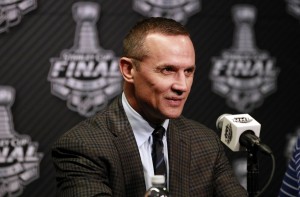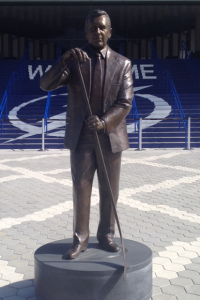The Tampa Bay Lightning are ranked No. 1 in the 2016 ESPN Ultimate Standings — a list that includes 122 franchises from across the NHL, NFL, NBA and MLB. The top spot was earned after a No. 3 ranking for the team in the 2015 edition.
The honor is national recognition of the rise the organization has taken on and off the ice since Jeff Vinik purchased the Lightning on Feb. 5, 2010.
Vinik’s Promise
Vinik made a pledge to the Lightning and the city of Tampa that day:
“Buying the Lightning and joining the Tampa Bay community is a dream come true. I’ve been an avid hockey fan my whole life and I pledge to our fans that I will work my hardest to build the Lightning into a world class organization both on and off the ice. I hope to bring a high level of excitement and intensity back to Lightning hockey, with a goal of having the team consistently compete for the Stanley Cup. I have a passion for the game and will do my best to restore a winning culture at the St. Pete Times Forum that all of our fans and partners can be proud of.” (NHL.com)
These were strong words setting a high bar for an organization often part of speculation about relocation and financial struggles long before Vinik arrived. At the time, most people in Tampa knew little more about Vinik than that he was a 50-year-old hedge fund manager with a part-ownership interest in the Boston Red Sox. Less than seven years later, however, they now know he is so much more.
Vinik’s contributions to the Lightning and the city of Tampa go further than what takes place on the ice and within the walls of Amalie Arena. A closer look at the transformation of the franchise and Vinik’s development of the surrounding community since he arrived, show how that pledge has been a mission statement that guides each of his decisions.
Building the Lightning
Vinik has helped to build a successful on-ice product by putting people in place who share his vision on and off of the ice.

It started by bringing in general manager Steve Yzerman — a Hall of Fame player and former Detroit Red Wings executive who echoed Vinik’s long-term mentality for a franchise that had lacked that sort of outlook as ownership changed hands five times in the team’s first 18 seasons. Vinik has trusted in Yzerman, who won three Stanley Cups as a player and another as an executive, to make the hockey decisions, while Vinik has ensured he’s had the tools within the organization and financially to make the Lightning a consistently competitive team on the ice.
When the Lightning decided to make a coaching change in the middle of the 2012-13 season, they turned to Jon Cooper — a players’ coach who rose up through the American junior hockey ranks and into the American Hockey League where he helped lead the Norfolk Admirals to the 2012 Calder Cup. Cooper had been with the organization since 2010 and had already developed relationships with many of the team’s future stars.
Vinik has faith in Yzerman and the team’s scouting staff to put together a roster of players that exude the sort of qualities Vinik wants for the franchise. He’s also confident in Cooper’s abilities to relate to his players and develop the sort of system that works best for their style.
With that long-term approach to the team’s on-ice product, the Lightning have made three trips to the Eastern Conference Final and a 2015 Stanley Cup Final berth in the past six seasons.
Remembering the Past
Vinik has taken a strong interest in remembering the team’s past by fostering relationships between the Lightning and former players and front office staff.

The Lightning have brought back former players like Dave Andreychuk, Brian Bradley, Jassen Cullimore and former general manager Jay Feaster to help develop the team’s relationship with fans and local businesses, grow the game of hockey in the area and to honor the team’s history.
Statues of team founder Phil Esposito and Andreychuk now greet fans as they approach Amalie Arena — helping to commemorate the important roles each played in bringing the franchise to where it is today. The walkways inside the arena are now lined in many places with pictures and larger signs of former players and important moments in team history. These serve to educate fans while also ensuring these players are not forgotten.
The Lightning also welcomed home former Captain Vincent Lecavalier on Oct. 18 and announced plans to retire Martin St. Louis’ No. 26 — a first for the franchise — on Jan. 13, 2017.
These are the sorts of things that develop a rich tradition for the franchise and establish the kind of environment that draws in talented players and keeps loyal fans.
Transcending the Fan Experience
Vinik and the Lightning have created an in-game experience that provides fans with a competitive on-ice product in a world-class arena while also connecting with members of the community in the process.
The Amalie Arena has undergone tens of millions of dollars in renovations since Vinik purchased the team, including the installation of an organ and upgrades to seating and arena concourses. An elaborate electronic and lighting display takes place before games and two tesla coils shoot out bolts of electricity as the Lightning take to the ice and when they score goals.
The game day experience gives fans a sense of pride in their community by recognizing the accomplishments of individuals, local teams and important events outside of the organization. The game often begins with a member of the military or local law enforcement who takes part in the playing of the National Anthem.
Before each home game, the team honors a Lightning Community Hero — an individual or organization that has performed a significant continuing service to others in the area — by presenting the person with a $50,000 grant towards those efforts on behalf of the Vinik Family Foundation and the Lightning Foundation. A video highlighting the community service is played during the game and the hero is honored by a standing ovation.
The Community Hero Program began in 2011 and in five years, resulted in $10 million worth of contributions to 220 different individuals and organizations doing good in the community. In April 2016, the Vinik family made another five-year, $10 million pledge.
Other important moments that build the connection between the Lightning and the community are the “Standing Salute” to honor a member of the armed forces, a “We Salute You, Tampa Bay” to honor the accomplishments of people in the community, among other activities.
In addition, the rebranding of the Lightning’s logo and team colors in 2011 has been a hit as most fans are wearing blue and white across the arena each game.
The on-ice game and in-arena environment create an exciting atmosphere for casual fans and diehards alike.
Developing the Community
Vinik relocated to Tampa and his real estate development joint venture, Strategic Property Partners, is currently transforming the city into the world-class place he envisioned when he purchased the Lightning.
Vinik and SPP are developing more than 50 acres in downtown Tampa focused on an urban multi-use community that utilizes the city’s waterfront and creates an environment where major companies and residents can work, live and play. The University of South Florida, a local college, will also be relocating its medical school to the heart of downtown, an area near many of Tampa’s biggest hospitals and a move that will draw students, professors and other medical minds to the city’s center.
The project will take years to complete, but ground has been broken on numerous phases of the project and the face of downtown is quickly changing in Tampa.
Looking to the Future
Vinik has endeared himself to the city of Tampa in a way that could not have been anticipated when he purchased the Lightning in 2010.

National publications have begun to take note, but for those living in Tampa, his efforts in building the Lightning, establishing relationships with the community and transforming the city are front and center every day. It’s those sort of qualities that have helped to make the Lightning a team held in the highest regard by its fans and a big part of what has drawn players like Steven Stamkos and Victor Hedman to sign long-term contracts to stay with the organization.
The Stanley Cup has eluded the Lightning since 2004, but has been within the team’s grasp the past two seasons. Yzerman and his staff have laid the foundation for a team that should compete for one for the foreseeable future. At the same time, Vinik and Strategic Property Partners will continue to develop Tampa to realize the vision they have for what it will become.
Vinik made ambititious promises when he bought the team in 2010, but much to the delight of Lightning fans and the city of Tampa, he meant every word of what he said.